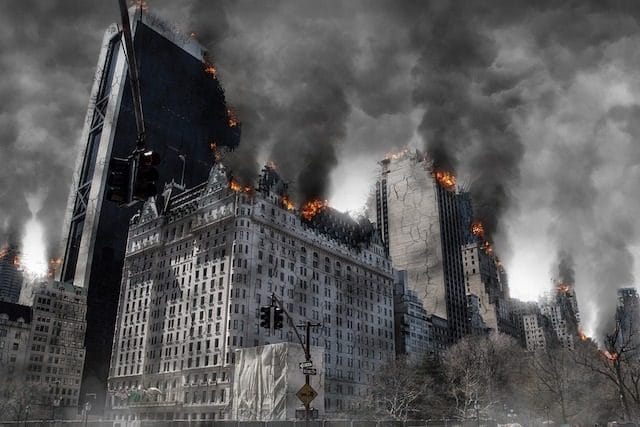With all of the hostility around the world today, it’s understable if you may be at least a little bit worried about becoming a victim of a nuclear attack. While we truly hope that you’ll never have to use this advice, it’s still important to be prepared for any possibility. Here are 10 survival tips on what you can do before, during, and after a nuclear attack.
10. Run
This goes without saying, but if you’re still alive after a nuclear attack, run for your life. If you are close to the area where a blast has gone off, do not look directly at it, because it can cause you to go blind. You actually want to open your mouth, because if you don’t, your eardrums will actually burst from the sound of the blast. Anyone within half a mile of where a nuclear bomb goes off has a 90% chance of dying immediately, and a 50% chance of being killed within a two-mile radius.
According to Professor Irwin Redlener from Columbia University, nuclear bombs produce a tremendous amount of wind following the blast. Take notice to which direction the wind is blowing, and where you see the most damage. Head in the opposite direction.
Radiation travels so quickly that if you are within a 5-mile radius of the blast, you will only have 10 to 15 minutes to seek shelter before you are pummeled with enough radiation to kill you. Your priority should be to get far enough away, or seek an appropriate shelter.
9. Get Inside
While this may seem like common sense, you need to get inside if you want to survive after a nuclear blast. During the Cold War, the prevailing advice was to “duck and cover,” even if it meant laying down in the middle of the street. At the time, the government had very little knowledge about fallout, and in the film, they compare a radiation flash to getting a bad sunburn. We now know that the reality is that the heat of an atomic bomb is tens of millions of degrees fahrenheit, and that it causes skin cancer almost instantly, even if you are several miles from the blast site.
If you are within 5 miles of an atomic explosion, and you don’t have enough time to run, the best option is to get inside of the basement of a tall building, or inside of an interior room without windows. If you live in a city, and you can’t find a basement to hide in, you can also run to the 10th floor or higher of a very tall building, because it should be high up enough to avoid at least some of the debris. Just keep in mind that going underground is always the best option.
8. Shield Yourself
If you are outside during a nuclear attack, and there are few options for places to hide, FEMA recommends finding a concrete building, and using it to shield yourself from the direction of the blast. This isn’t ideal for a long-term hiding spot, but it could possibly give you enough time to survive the initial attack before moving on to find a better shelter.
After the attacks on Hiroshima, the only building that survived near the center of the blast was the concrete Genbaku Dome. Today, the site is used as a museum and memorial for the lives that were lost during the attack.
7. Avoid Fallout
If you are living within a few miles of a nuclear attack, your main concern should be avoiding fallout. And no, we’re not talking about the popular video game franchise. Fallout is a mix of dirt and radioactive debris, and it moves with the wind. Within the first week or two after a blast, it can be carried several miles away from ground zero. Even if you live 50 to 100 miles away from a blast site, pay attention to the news about the direction of where the fallout is moving, because it’s possible that you may still have to evacuate, or take shelter underground to avoid radiation.
If you’re not sure if you live within a safe distance of any potential attack, there is a rather frightening website called “Nukemap” that allows you to simulate what would happen after a nuclear explosion, and it will tell you just how many miles fallout is likely to travel.
6. Distance Yourself
According to Ready.gov, the most likely targets for a nuclear attack would be locations that would be considered important for commerce or government, such as capital buildings, military bases, power plants, and major ports for transportation. Obviously, if your job keeps you close to these places, you may not be able to change where you live. But if you are given a warning that a missile is on its way, be sure to get as far away from any of these types of buildings as you possibly can.
If you happen to be driving when you get a text message about an impending nuclear attack, it’s best to get as far away from the blast site as humanly possible. However, it’s also best to avoid driving on major highways, especially since you may have mere minutes to seek shelter.
In the event of a disaster, highways tend to get jammed when they fill with people who are desperate to get out of a city. If you have ever seen The Walking Dead, you may remember the highway leading out of Atlanta filled with cars of people who were trying to get away from zombies. Unfortunately, if an entire city has 15 minutes to evacuate, highways would look just like it did in the TV show. If at all possible, stick to driving on back roads.
5. Get Clean

If you happened to be outside during a nuclear blast, or you’ve been evacuating, it’s likely that fallout settled on your clothing and skin while you were seeking shelter. This means that you should clean yourself off as soon as you are safely inside a shelter. Ready.gov recommends removing your the clothing you were wearing, tie it in a plastic bag, and place it as far away from humans and animals as possible.
Take a shower, but be careful not to scrub too hard, because scratching your skin will be far worse. Use as much shampoo and soap as possible, but do not condition your hair or use lotion, because it will hold any radioactive materials to your skin. Blow your nose, wipe your ears, and eyes. After this first shower, it’s best to avoid tap water after that, because the radiation from the fallout will seep into the groundwater.
4. Stay Inside, and Wait for News

Once you are in a shelter that is a safe distance from the center of a nuclear blast, it’s still possible for radiation to linger for several weeks, or longer, depending on the size of the bomb. After the nuclear power plant disaster in Fukushima, the town remained uninhabitable for years after the blast.
Unfortunately, there is no way of knowing just how bad radiation will be until the disaster occurs, but it’s estimated that it will take anywhere from a few days up to a few weeks before radiation levels disperse enough to make it safe to go outside. Listen to your radio, TV, or internet for updates on when it’s safe to go out.
3. Do Not Scavenge
In most movies of a post-apocalyptic world, we see characters raiding grocery stores or farms for food and supplies. While that might make sense during a zombie apocalypse, it’s the last thing you’ll want to do when surviving nuclear fallout. Just like groundwater, radiation can spread into food and livestock. No matter how tempting the food is on the shelf, it’s best not to eat it, because you will be ingesting something that was fully exposed to radiation. Don’t be tempted to steal non-food items, either, because you’ll be carrying the radiation away with you.
After the nuclear disaster in Fukushima, even cars, gold, and jewels were left behind due to the high levels of radiation lingering on everything. If you’re outside at all, it’s much smarter to spend that time evacuating than hanging around scavenging.
2. Have an Escape Plan
Now that you know what to do if you’re caught off-guard by a nuclear blast, it would be wise to prepare an escape plan for your family and friends. If you live in a city, find out where your local nuclear bomb shelters are located, and calculate just how long it would take for you to get there from work and home.
Google Maps actually provides the addresses of nuclear fallout shelters. It’s worth taking a few minutes out of your day to see exactly which buildings you can run to, in case of emergency.
1. Be Prepared

Last and definitely not least, you should stock your home with preparations for any disaster, whether it’s as natural as a hurricane, or as apocalyptic as nuclear fallout. Be sure to keep bottled water, canned food, a first aid kit, and flashlights. According to the Center of Disease Control, potassium iodide helps to prevent your thyroid gland from absorbing radiation.
You should be able to find these tablets at your local pharmacy. You can also buy solar-powered battery packs to charge your smartphone, in case the power goes out. There are plenty of doomsday prepper websites out there, if you want some more ideas on what you may need to get ready for a potential attack.
4 Comments
You managed to make three points into ten (6 or 7 of them where “leave the area and get as far away as possible”). Good job.